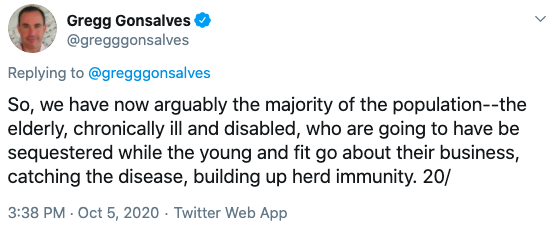The Great Barrington Declaration Is Not Saying ‘Lock Up Grandma’

Across the political spectrum, pundits claim to be “[listening] to the scientists” while asserting that individuals they don’t agree with are not. In addition to being an inane response, that exhortation implicitly suggests that there is a scientific consensus on policy. There is not: not among laymen, and certainly not among experts.
It tends to break down this way. On one side are pro-lockdown experts, focused exclusively on the novel coronavirus and Covid-19: blindly following their unmovable biases pursuing self-promotional, Faucian interviews to increase citations. On the other side are the few willing to speak against the ‘run and hide’ narrative, risking their careers, reputations, and possibly their and their families’ safety. Consequently, we have an apparent “consensus” driven by the left-dominant view: that lockdowns are essential until a vaccine is developed.
Until now, dissenting opinions have been muted until the publication of the Great Barrington Declaration.
The Great Barrington Declaration doesn’t deny that Covid-19 may lead to sickness and death in elderly and vulnerable individuals, but its focus is on avoiding the unnecessary physical, mental, social, economic, and educational impacts of lockdowns, which if appended to a discussion appear as a mere footnote to the policy debate. It proposes a “focused protection” strategy of safeguarding the elderly and other at-risk individuals (those with comorbidities, compromised immune systems, etc.) while allowing low-risk groups to carry on their lives with the ultimate aim of reaching herd immunity.
Yet as the advice of the esteemed public health officials in the Great Barrington Declaration has spread, the media and other scientists are doubling down on their arguments. Since its signing on Sunday, October 4th, 2020, a slow but steady drumbeat of criticism has emerged, overwhelmingly falling into the following categories:
- “You want to lock up grandma?!”
Based upon certain media coverage, one would think that the Great Barrington Declaration advocates essentially imprisoning the elderly — but surely, it doesn’t. “When people say ‘oh you can’t seal up 60 year-olds.’ Well of course not. Not forever. That would be a very drastic thing to do,” says Sunetra Gupta, “but for three months rather than, you know, stopping children from going to school for a very long period of time. That’s the tradeoff to consider.” Yet much of the press and lockdown proponents remain convinced that the Declaration discriminates against and singles out the elderly, disabled, and sick to the benefit of the young, able, and healthy.

This response channels outrage, gasping at the allegedly awful and positively inhumane nature of this policy suggestion.
- The Scholarly Article
On a forum, Professor James Naismith acknowledges the value of return to normalcy, citing a massive litany of information he asserts that the writers and signatories of the Great Barrington Declaration would have to consider before he would support it. He acknowledges that “actual implementation may be beyond the expertise of the signatories,” which leaves his caveat in a confusing state of limbo.
The nature of this criticism demands a 30-page scholarly article of the type which only journal reviewers and closely-associated academics would read. This, of course, is the fate of the overwhelming majority of peer-reviewed research anyway, and if the Declaration’s authors sought to publish a policy proposal or scholarly article there is nothing stopping them from doing so. The Declaration and subsequent research are mutually exclusive enterprises.
- The Prescriptive Policy Paper
Much like the previous argument, some have voiced concern that the Declaration has not explained exactly how Focused Protection would work, among other things. These critics expect the Declaration to be more prescriptive: perhaps akin to a 500-page policy paper detailing how every level and corner society should be run. Each society and culture is unique, with its own NGOs, volunteer organizations, and even government agencies who would undoubtedly step forward to help where and as needed. Part of the beauty and power of the Great Barrington Declaration is not only its adherence to natural principles, but its simplicity: a bureaucratic, exquisitely detailed plan not only isn’t necessary, but would likely bungle its execution.
The Declaration was purposely restricted to a single page of approximately 500 words in order to make it more publicly-appealing and accessible. It is the first step, opening a debate such that alternate policy proposals can be called into consideration. Epidemiologists are part of an interconnected web of medical and health care professionals and institutions who together can collaborate and produce better outcomes.
“This idea that scientists should tell us politically what to do is a mistake,” said Declaration co-author Jay Bhattacharya, “Scientists can inform the debate about what should happen but fundamentally the trade-offs that are involved are political trade-offs.”
- The Ideologues
Needless to say, any policy prescription is up for debate. Covid-19 has, most unfortunately, contributed to the unprecedented degree of politicization in American society today. Hyper-politicization has brought out the worst in us: stereotyping individuals according to their opinions, specifically regarding masks and their observation of social distancing guidelines. Non-mask wearers are often denigrated as likely racist, MAGA-hatted Trump supporters (at the very least as selfish individualists), while the observantly masked are characterized as cowardly, germaphobe control-freaks or privileged elites for whom working from home is a fait accompli. This is less a critique than a sweeping generalization, typically made to avoid nuanced thought.
If you’re in the wrong camp, it doesn’t matter how educated you are on epidemiology, medicine, statistics, or any other specialization. Among many other places this is demonstrated by a comment on the same forum from Dr. Stephen Griffin, who accuses the signers of supporting an “ideology” and “seizing upon dissatisfaction and political failings.”
Drs. Gupta, Bhattacharaya, and Kulldorff did not write the Great Barrington Declaration as a definitive, be-all and end-all regarding lockdowns or Covid-19. Their goal was to inform and stimulate debate with respect to public health outcomes in the midst of the current pandemic. As Dr. Gupta repeatedly states, “What we can do is encourage that debate. That’s what we’re trying to push.” If it’s true that diversity strengthens workplaces and communities, it certainly seems that diversity of opinion would foster more productive discussions.
- The ‘Immorality’ of Herd Immunity
Perhaps because the term alludes to animals — and, in particular, farm animals — a frequently heard reaction to the term “herd immunity” is that it contemplates a ghastly, quasi-Darwinian “culling of the sick and disabled.”
Human beings face so many risks daily that we lose track of them: eating, drinking, driving to work, flying on aircraft, riding in elevators, swimming in the ocean, and so on ad infinitum.
Yet as Dr. Martin Kulldorff has pointed out, that fear shouldn’t lead to “[shifting] the burden from the more privileged members of society, which includes you and me, onto the working class who are required now or are being forced to bear the burden of Covid-19 or the pandemic and it’s a double whammy for them.”
As panic over Covid-19 arose and rapidly spread worldwide, many adopted an untenably risk-averse posture despite the comparatively higher risks we live with as a matter of course and evidence. Writ large, the combination of government policies and a predilection to avoid risk have forcibly prevented other people from taking small risks which they might have done to the ultimate benefit of all: in so denying them, risks of different types were incurred, albeit invisibly.
Not everyone is fully aware of their complete health status, which is why we visit doctors and medical specialists for checkups and, when required, treatment. But most of us know sufficiently enough of our own health status and thus have a good sense of our intrinsic vulnerability to a novel flu. The elderly are vulnerable, and sadly some of the most vulnerable are no longer with us — in no small part owing to the decisions made by politicians like New York State Governor Andrew Cuomo. With suitable precautions to protect the vulnerable, there may inevitably be a slight uptick in fatalities, but not the tsunami of death hysterically (and, thankfully, inaccurately) predicted by the media.
- Camp ‘Covid doesn’t just kill you’
There are, additionally, allusions to the unknown and not-fully-understood long-term effects of Covid as “more and more people have come forward to report that they experience symptoms for many weeks or months after the illness is meant to subside.” The burdens of such ‘long Covid’ symptoms are experienced even by the young — and apparently include fever, headaches, loss of smell, and fatigue.
The prospect of facing each day with the personal, social, economic, and other baggage associated with lockdowns, and isolation is, no doubt, creating long-term, life-shortening effects: stress will kill vastly more people than Covid-19 ever could. While there might be long-term effects of Covid, the symptoms cited above could just as easily be effects of psychological damage owing to government policies.
For individuals of an advanced age and with realistically shorter life expectancies — with or without health problems or comorbidities, many don’t worry about Covid. At the very least, most would like to take precautions but not forsake opportunities, where possible, to spend time with family — grandchildren in particular. For those people, concerns about the long-term effects of Covid are likely of diminishing import.
Like the mental, social and physical effects of current policies, long-term health effects stemming directly from Covid should become part of mainstream discussion, tempered by the fact that the start of the spread of the novel coronavirus is still less than one year ago.
- The Dated Sensationalists
A pernickety article by the science editor of Wired argues that the Declaration is behind the times and is fighting against lockdowns that have already been lifted. In fact, lockdowns persist in various stages worldwide, in particular in large U.S. cities owing to ‘phased re-openings’ in many places and, worse yet, lockdowns are being reimposed in certain places. A large percentage of American school children are learning remotely. After 7 months of Covid-19 the media’s proclivity to mislead and waver in their coverage is now well-established, as was demonstrated in the The New York Times pendulum swing from “Here’s How to Crush the Virus Until Vaccines Arrive,” to “A Vaccine That Stops Covid-19 Won’t Be Enough,” later that month. The only consistent position perpetuated by the media is the certainty of inevitable doom and every suggestion of fault or flaw pointing directly to the White House.
The Great Barrington Declaration is about everyone: the healthy and the vulnerable, being free to make personal risk assessments, given local information and the personal circumstances they face. Every individual needs to consider their own health (and that of their household), the balance between their risk appetite and their desire to maintain normalcy in their lives, and the costs of isolation: physical, mental, social, economic, educational, and so on. These assessments, in a free society, form the bedrock of an equitable means of preserving human rights and individual dignity.
Join us. Read and sign the Great Barrington Declaration.













